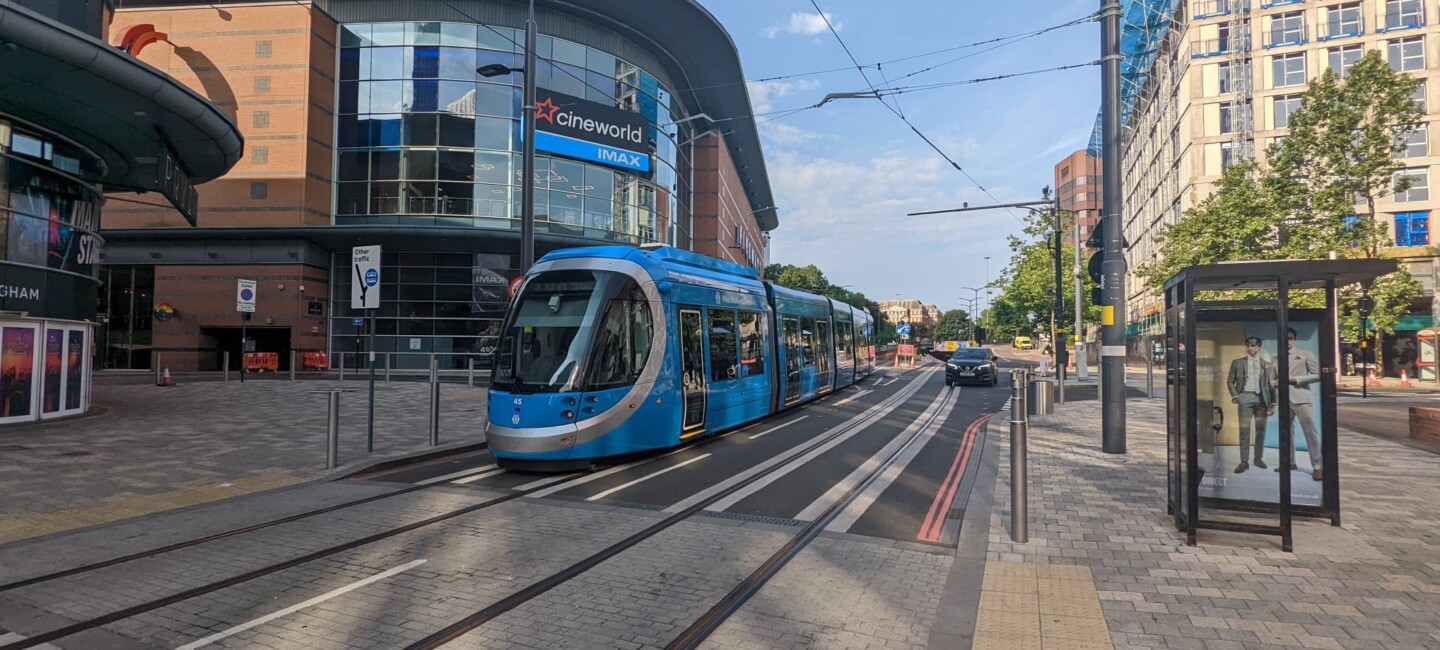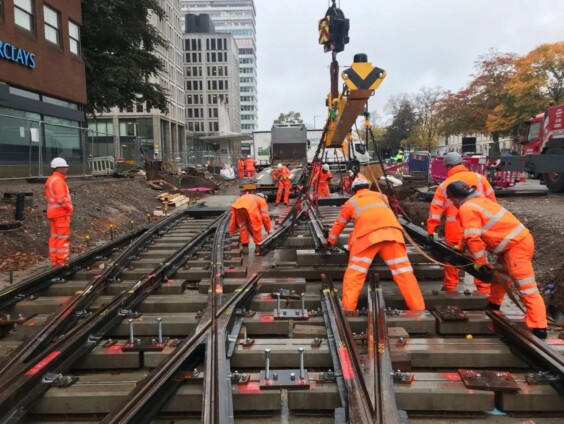Tramline boosts Birmingham’s economy and community

Birmingham is the second largest metropolitan area in the United Kingdom and a place where a more sustainable future is currently being constructed for millions of people. One key element in this is developing public transport: The region’s old 20 km tramline will, for instance, see an extension of 34 km by 2026. The massive project is being steered by the Midland Metro Alliance, whose main contractor is Colas Rail. We caught up with them seven years into their decade-long period of work.
Building a new tramline through close cooperation
The Midland Metro Alliance aims to promote the economic and social development of the West Midlands region and the city’s ambitious sustainability goals. A more extensive rail network makes transportation more sustainable and reduces traffic congestion. The new connections also intersect with the larger public transport network and make it easier for people to get around between their homes, workplaces and various recreational activities.
In addition to Colas Rail, the alliance consists of eight other partners and is able to handle everything from design to construction. In addition to road construction and rail installations, and with support from Bouygues and Colas Ltd, Colas Rail are in charge of structure, cabling, lighting, system and power supply installations as well as municipal engineering.
“Our key strength is the close cooperation between the customer, designers and contractors. The project is a cooperative effort, and we share both its risks and opportunities. Everyone is an equal partner with one another, and experts taking part in the different phases of the project bring together their personal skills and experience,” says Maria Ion, Project Director at Midland Metro Alliance and Colas Rail.
The alliance currently consists of four separate projects
The alliance is a continuation for two projects in the area which wrapped up in 2015 and 2016 respectively where the original 20 km West Midlands tramline was extended to the city centre and Birmingham New Street Station. After the two mini-extensions the alliance was formed in 2016, continuing the work further.
The alliance consists of four separate projects. On the west side of Birmingham the extension was completed in 2019, after which the line has also been extended towards Wolverhampton City Centre and Edgbaston. The line is currently being extended east of Birmingham by 1.7 kilometres and from Wednesbury to Brierley Hill by 11 kilometers.
Alongside of the new tramlines, the alliance also contains complimentary tramway projects such as tramway renewals and improvements such as automated ticketing and new power supplies. In addition, the alliance delivers an expansion to the existing tram depot in Wednesbury.
Even though the alliance is one big entity there are multiple separate projects. The construction projects, renewals and improvements are all part of the same alliance, but at the same time they are each their own entity and require, for example, their individual legislative permits before implementation.

Positive effects can already be seen in the region
“The project is of a considerable size and its impact is already visible in the region. A good example was the Commonwealth Games hosted by Birmingham in 2022. The success of the massive, international sporting event shows that the part of the tramline extension that has already been completed is able to serve hundreds of thousands of guests in an environmentally friendly and sustainable way,” says Ion.
The ever-expanding tramline network is the regions solution to transporting large quantities of people in a way that supports the city’s sustainability goals. The project has economical benefits for the region as well.
“The project has created a huge number of jobs for local experts during the development and construction phase. In the long term, a more extensive and sustainable traffic network will also make the city a more profitable location for corporate headquarters and service providers, for example.”
A varied operating environment requires new innovations
Millions of people live, work and commute in the immediate vicinity of the new tramlines, and there’s much more than just functionality that must be considered. As such, the alliance has developed innovative solutions to protect the region’s history and cultural value. A section of the rail network, for instance, doesn’t have any overhead wires and trams drive through it using battery power. This way the city’s iconic silhouette with landmarks such as Victoria Square, the Council House, the Town Hall and the library has been kept intact.
“The wire-free tram was the first of its kind in the UK. The project’s achievements haven’t gone unnoticed and it won the Outstanding Engineering Achievement category at the Global Light Rail Awards in 2019. Innovation and ambition are important values for us in every expansion project, and some of the other extensions have new innovative elements as well, such as green or prebuilt rails,” Ion says.
Finding new paths through challenges
The project has also faced its share of challenges. In addition to practical issues on a local level, there have also been global disruptions that have forced the alliance to find alternative approaches.
“During the last few years, we have seen a pandemic, an energy crisis, soaring inflation and the start of a war in Europe. Despite the many challenges, we have managed to adapt to the new situations, and the project has progressed in schedule through the cooperation and innovativeness of all parties,” Ion says.
Birmingham’s new tramlines represent the future of urban transportation and serve not only local users, but also other travellers in the region and the environment.
“The expansion is an investment in the city’s sustainable public transportation system. At the same time, it allows West Midlands residents to commute easier and more environmentally friendly both locally and nationally. Sustainability is unquestionably at the heart of all construction projects these days, and a key pillar of this one as well.”
Photos: Midland Metro Alliance
